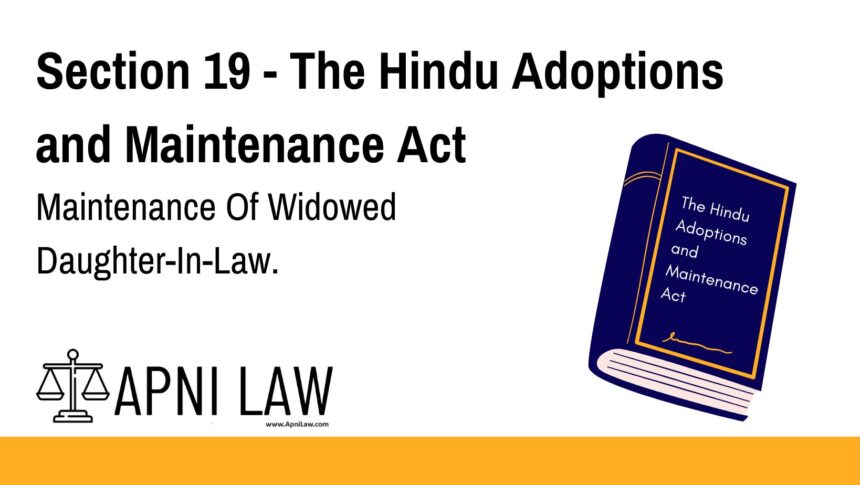Code: Section 19 of the Hindu Adoptions and Maintenance Act, 1956
(1) A Hindu wife, whether married before or after the commencement of this Act, shall be entitled to be maintained after the death of her husband by her father-in-law:
Provided and to the extent that she is unable to maintain herself out of her own earnings or other property or, where she has no property of her own, is unable to obtain maintenance―
(a) from the estate of her husband or her father or mother, or
(b) from her son or daughter, if any, or his or her estate.
(2) Any obligation under sub-section (1) shall not be enforceable if the father-in-law has not the means to do so from any coparcenary property in his possession out of which the daughter-in-law has not obtained any share, and any such obligation shall cease on the remarriage of the daughter-in-law.
Explanation of Section 19
Section 19 of the Hindu Adoptions and Maintenance Act, 1956 lays down the legal responsibility of a Hindu father-in-law to maintain his widowed daughter-in-law, under specific conditions. This provision is intended to provide support to a woman who is left vulnerable after her husband’s death and who lacks the means to support herself.
Key Provisions:
- The widowed daughter-in-law is entitled to maintenance only if:
- She cannot support herself from her own income or property, and
- She is unable to receive maintenance from her late husband’s estate, her own parents, or her children.
- The responsibility lies with the father-in-law, provided:
- He has the financial means to provide maintenance from any coparcenary property in his possession, and
- The widowed daughter-in-law has not already received a share of that property.
- The obligation of maintenance ends upon:
- The remarriage of the daughter-in-law.
This section reflects both familial responsibility and reasonable limits to that obligation. It ensures support for the widow while balancing the financial capacity and legal responsibilities of the father-in-law.
Illustrations
Example 1: No Earnings or Support
A young Hindu woman loses her husband and has no source of income or property. She is also unable to receive support from her parents or children. Her father-in-law, who possesses ancestral property (coparcenary property), is legally bound under Section 19 to maintain her, provided she hasn’t received a share from that property.
Example 2: Remarriage Ends Obligation
A widowed daughter-in-law is receiving maintenance from her father-in-law. Upon her remarriage, this legal obligation ceases automatically under Section 19(2).
Example 3: No Coparcenary Property
If the father-in-law has no coparcenary property or lacks financial means, he is not legally bound to provide maintenance under Section 19(2).
Common Questions and Answers
1. Who is responsible for maintaining a widowed daughter-in-law?
The father-in-law, provided the widow has no other means of support and he has sufficient coparcenary property from which she hasn’t received a share.
2. Does this right apply to women married before the Act came into force?
Yes. Section 19 applies to all Hindu wives, regardless of when they were married.
3. What if the father-in-law does not own any ancestral property?
If the father-in-law lacks coparcenary property or financial means, the obligation under Section 19 is not enforceable.
4. Does the right to maintenance continue after the widow remarries?
No. Upon the remarriage of the daughter-in-law, the legal obligation to provide maintenance under this section ceases.
5. Can the daughter-in-law seek maintenance from others?
Yes. Before the father-in-law’s obligation arises, the widow must attempt to obtain support from her own property, or from her late husband’s estate, parents, or children.
Conclusion
Section 19 of the Hindu Adoptions and Maintenance Act, 1956 safeguards the rights of a widowed Hindu woman by recognizing the conditional responsibility of her father-in-law to provide maintenance. This provision upholds traditional family support structures while establishing clear limits and obligations.
To explore your legal rights under Hindu personal laws or to seek guidance in matters of inheritance and maintenance, visit ApniLaw.








